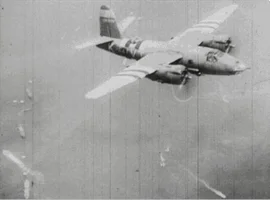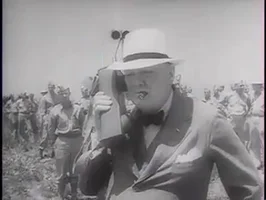Hi! Welcome back! Today we’re going to talk a little bit about history! Our “World War II Quiz” is not a simple test you take in school. It is way more fun than that. Good luck!
Do you want to try our World History Quiz?
World War II, or the Second World War, was the most destructive global conflict in history, lasting from 1939 to 1945. The war pitted the Allied forces, led by Britain, the United States, and the Soviet Union, against the Axis powers of Nazi Germany, Italy, and Japan. The war began with Nazi Germany’s invasion of Poland in 1939 and ended with the surrender of Japan in 1945.
Do you like Apple products? You should try this quiz…
The origins of World War II can be traced back to the Treaty of Versailles, a peace treaty signed after World War I. This treaty placed heavy reparations on Germany, which caused extreme economic hardship and political unrest within the country. Adolf Hitler, a German politician, and leader of the Nazi Party sought to gain control of Germany by exploiting the nation’s anger and resentment towards the Allies. Hitler’s militaristic policies, such as the Anschluss (the annexation of Austria) in 1938 and the invasion of Czechoslovakia in 1939, violated the Treaty of Versailles and were met with little resistance from the Allies. Meanwhile, Japan was expanding its empire in the Pacific, seizing control of Manchuria and parts of China.
These aggressive actions, and Hitler’s increasing power, led to the formation of the Axis powers. In September 1939, Nazi Germany invaded Poland, initiating the start of World War II. The Allies declared war on Germany and, soon after, Italy and Japan declared war on them in turn. The war was fought on multiple fronts, including the Eastern Front between Nazi Germany and the Soviet Union, the Western Front between Germany and the Allies, and the Pacific Front between the Allies and Japan.

The war was characterized by extreme brutality, with millions of civilians and military personnel killed and millions more displaced. It resulted in the atomic bombings of Hiroshima and Nagasaki, the Holocaust, and the establishment of the United Nations. Though a global conflict, World War II was fought mainly in Europe and Asia, with the United States and the Soviet Union emerging as the two dominant world powers.
World War II was a global conflict that occurred between 1939 and 1945. It was the most destructive war in history and its consequences are still felt today. The death toll of World War II was enormous, with estimates ranging from 50 to 80 million people killed. This included deaths due to battle, civilian casualties, and those killed in concentration camps. It was estimated that over 6 million Jews were killed in the Holocaust alone.
The effects of the war were felt throughout the world, from the physical destruction of cities and infrastructure to the psychological trauma of survivors. Millions of people were displaced and suffered from hunger, disease, and poverty. In addition, the war had a profound impact on the political landscape of the world, with the emergence of the United Nations, the creation of a divided Germany, and the spread of communism. World War II also had a deep impact on the economy of many countries, as the conflict resulted in a sharp decline in international trade and investment, as well as widespread inflation. This was particularly true in Europe, where the war had destroyed many factories and businesses.

The end of the war also resulted in a shift in the global balance of power, with the United States emerging as the world’s most powerful nation. This power shift had far-reaching consequences, as it resulted in the Cold War between the United States and the Soviet Union. The legacy of World War II is still felt today, with the United Nations, the European Union, and other international organizations playing a key role in global affairs. The war also had a profound impact on culture and society, with its legacy being felt in literature, art, and film. In short, the consequences of World War II were vast and far-reaching. It is a conflict that still affects us today and its legacy will continue to shape our world for many years to come.
World War II was a period of major technological advancement that saw the invention of a wide range of new technologies. From the famous atomic bomb to the invention of the computer, the war was a catalyst for some of the most important inventions of the 20th century. In this article, we’ll explore some of the major inventions of World War II and their impact on the world.
The atomic bomb is perhaps the most famous invention of World War II. The development of the atomic bomb began in the 1930s, but it was the war that spurred the project to completion. On August 6, 1945, the United States dropped the first atomic bomb on Hiroshima, Japan, which effectively ended the war. The atomic bomb also changed the course of international relations, as it ushered in a new era of nuclear deterrence and the Cold War.
Can you pass the world’s shortest IQ test?
The jet engine was another important invention of the war. Jet engines allowed aircraft to reach much higher speeds and altitudes than propeller-driven planes. This technology was instrumental in the development of strategic air power and would become the cornerstone of air combat in the decades that followed. The modern computer is another invention of World War II, as the war effort spurred the development of machines that could rapidly process data.
The first computers, such as the ENIAC, were developed in the 1940s to calculate artillery shell trajectories and other data. These computers paved the way for the development of the modern digital computer. The invention of radar was also incredibly important during World War II. Radar allowed Allied forces to detect incoming enemy aircraft and ships, giving them a huge advantage over the Axis forces. Radar technology would also be instrumental in the development of the Cold War-era nuclear missile defense systems.
Try our Countries of the World Test!
The invention of the helicopter was another important development of the war. Helicopters allowed for the rapid deployment of troops, as well as the evacuation of wounded soldiers from the battlefield. The helicopter also allowed for the development of air-to-ground missile systems, which were used extensively during the Vietnam War.